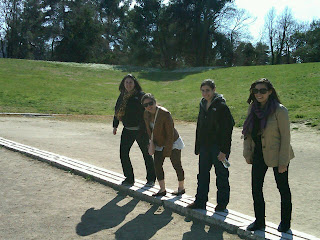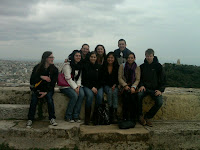
Thursday, March 17, 2011
Saturday, March 12, 2011
We're Back!

Our trip to Greece tracing Thucydides' telling of the Peloponnesian War exceeded expectations for everyone. The success of the trip is in large part due to excellent planning and execution of the itinerary by a number of very capable professionals in Boston and Athens, to whom I'm very grateful. Experiencing the Peloponnesian War beyond the pages of history, made something that was a legendary tale into reality.
Reviewing the geopolitical characteristics of the competing city states allowed for a deeper understanding of the continued importance of geography to the nature of state competition and to the social, economic, and political character of society. The juxtaposition of the stark and drastically different political cultures of Athens and Sparta emanates in part from the closeness and harshness of the landscape of the Tayetos plateau vis-a-vis the openness to the sea that democratic Athens develops.
We also had the chance to combine the stories of antiquity with the contemporary reality of Greece and its people and culture. Thank you to all for a very successful and fulfilling experience.
Thursday, March 10, 2011
This is Sparta!
 I couldn't resist the title of this entry, as we have made it to the town of Sparti (Σπαρτη). This town in the plateau of Tayetos mountains was in antiquity the opposing pole of power to democratic and seafaring Athens. This was the classical geopolitical confrontation between land- versus naval-power. The rugged land-locked terrain of Sparta forged a distinct social, political, and economic structure. The ambition of Athens was matched with the practical conservatism of Sparta. These two socio-political systems represented by the two city-states of antiquity could not avoid the centrifugal forces of competition and envy which resulted in a devastating and mutually suicidal war.
I couldn't resist the title of this entry, as we have made it to the town of Sparti (Σπαρτη). This town in the plateau of Tayetos mountains was in antiquity the opposing pole of power to democratic and seafaring Athens. This was the classical geopolitical confrontation between land- versus naval-power. The rugged land-locked terrain of Sparta forged a distinct social, political, and economic structure. The ambition of Athens was matched with the practical conservatism of Sparta. These two socio-political systems represented by the two city-states of antiquity could not avoid the centrifugal forces of competition and envy which resulted in a devastating and mutually suicidal war.
Wednesday, March 9, 2011
The historical turning points at Sphakteria


Tuesday, March 8, 2011
Olympic Students

After changing our charted path due to unusually inclement weather, we arrived at Olympia a site of Hellenic unity for the Greek city-states during antiquity. The denial of participation of the Lacedemonians by the people of Elis to the site of Olympia at 420 BC was the cause for the second phase of the Peloponnesian war.
Monday, March 7, 2011
At the Parthenon


Sunday, March 6, 2011
Emmanuel at Delphi in search of Thucydides



